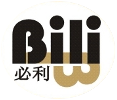How to check out a Chinese company, factory or supplier to confirm if they are properly registered and or have a legitimate business license:
- Are you concerned about doing business in China because it is so far and so foreign?
- Are you worried about sending money to a company that you don’t really know is real or not?
- Are you having trouble getting a response from someone that you just sent money to?
- Have you engaged in business with a Chinese supplier but now concerned if the are legitimate or not?
- Are you worried the Chinese supplier you started to do business with is no longer in operation?
You should be concerned! There are literally millions of trading companies here in China and some of them have had their business license revoked but they are still doing business. There are millions of factories operating without a proper business license and there are millions of suppliers who do not have the legal right to do business with you. Everything from English teachers to bogus trading companies to illegitimate factories all of which will say what you want to hear to get your business. Sometimes it works out well but if a problem arises and you’re not doing business with a registered and legal entity then the best lawyer in the country won’t be able to help you.
You have probably heard stories or maybe, unfortunately you have had a bad experience. It is not all that uncommon and not always the intention of the supplier to cheat you, to disappear or just give up and quit on you half way through a project. Sometimes it just becomes too much of a problem for them and they just give up and quit. Either way you get screwed.
There are many reasons for this to happen. Some legitimate and some illegitimate. Let me share a couple of real examples to demonstrate what kind of problems happen and some preventive measures you can take so it doesn’t happen to you.
Example 1: Mark from Canada
Mark builds clocks, beautiful wood clocks but the rough work is very labor intensive so outsourcing this part to China made sense. He searched on Google and found several clock manufacturers, in fact, one area of this province was well known for clock manufacturing that stemmed all the way back to Germany occupation of this area. He choose one of the companies who had a functional website, pictures of the factory and even pictures of clocks very similar to what he wanted built.
It all looked promising and emailed the company with his request. The company seemed to respond well and all in English. Mark sent a sample to the factory and the factory provided a quote. Everything looked good so Mark decided to wire a deposit and start the first production run. The money was to be wired to “Tan Jin Lei of Qingdao Yuanhao Weiye Import & Export Company Ltd.” on March 7th and 20 days later they were to provide some product. March 28th Mark contacts the company and doesn’t get a response. He tries again on 4/4, 4/6 and 4/9 with no response. On April 12th Mark tracked my company down and asked if I could check to see if this company was really there or did he get scammed.
It is a local company so we do a typical online Chinese company registration check with the local Industrial and Commercial Administration Bureau Website.
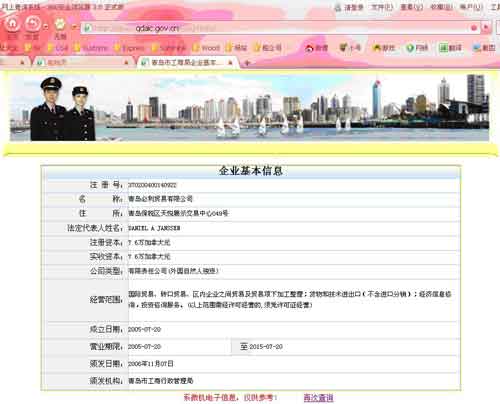
This screen shot shows the search results for the said company. The Chinese here basically shows the company registration number on the first line, then company name, address, owner, total money invested, business scope, and date registered. This company is registered so we give them a call and tell them we are acting on behalf of Mark and would like to check the status of his order.
We find out the trading company Mark wired the money to doesn’t really have a clue what is going on, nobody has checked recently and it kind of seems like they have forgot about it. We track down the actual factory and learn they did receive the sample Mark sent and they were going to build a sample for Mark. We take a picture of the wood they said they were going to use, get some details of when the order would be complete and send it to Mark.
Mark sees the picture and quickly recognizes they are using the wrong wood. He asks what wood it is and sure enough they were going to build his samples out of an inferior product so he rejects that and requests what they agreed to. The factory says the most common words we hear in China “mei shi” meaning “it doesn’t matter” and then add then next most common words “cha bu duo” meaning “its close” to which Mark replies if you don’t use the specified wood then give me my money back.
The factory then says for that you will have to deal with the trading company you wired the money to. We talk to them and they start doing their round and round stories and bullshit until we just simple say return the money. They say okay and they will wire it back in ten days. Ten days go by and Mark says “I still haven’t received the money”. The company says next week, and still no money and stops replying to Marks emails. Mark calls us up again and asks us to go to the police and we do. The police aren’t much and try to defer it to the courts but I manage to get them to call the company and they promise to wire the money the next day. Next day goes by and guess what? I hope you guessed right, no money. There is much more to the story but to cut it short four months goes by and no return of money. The only option for Mark would have been to go to court of course here in China so Mark ends up writing it off as bad debt.
The moral of this story is this company never intentionally set out to scam Mark, at least not in the beginning. They are just extremely disorganized, poor administers and managers of a project, lack of clarify and expectations on both sides and then it just became too much of a hassle so they just go round and round with bullshit and lies until you just give up. Fortunately for Mark the dollar value was quite low.
There were several things wrong with this method of sourcing a supplier and here are just a few of them.
- No contract with the who, what, why, where, when answered before wiring money.
- No system in place for accountability.
- No system in place for tracking.
See the article on “How to Source a Supplier” for details on the many problems associated with sourcing and how to do it right.
Example 2: Glass in Poland
Glass company from Poland:
A major importer of glass calls us up last year and tells us they are having difficulty getting results with their current Chinese supplier. They tell me that a quite substantial order is being help up in the factory because the factory wants to increase the price before they ship it out.
The Polish glass company of course is upset with this and sources and alternative supplier for future orders. They tell me they found another supplier and got a quote and some other information but due to this last experience they are not sure if they can trust them and called us to ask if we can check them out. We oblige and they proceed to provide the name and number of the new facility.
We log on to the provincial Industrial and Commercial Administration Bureau website for that particular province and entered the name of the company.
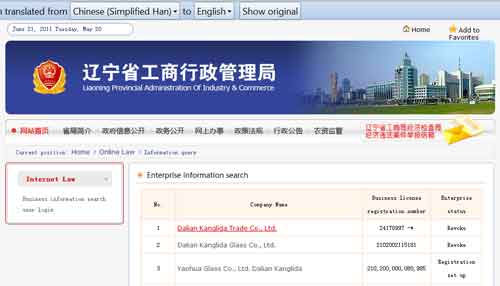
The search results using Google Chrome which does a translation shows that the company in question has had their business license “revoked”, both the glass factory and the trading company they registered using the same name.
This means that the factory and or trading company have violated some of the countries rules and or regulations and or they are under investigation for something. You can bet there are some shady business practices going on with them and it is highly recommended to stay as far away from companies like this as you can.
It would be extremely high risk to engage in any business because they are no longer a legal entity and you will have no recourse if something was to go wrong.
As you can see from the above examples there is a real need to do your due diligence and research the company that you are planning to do business with before you send any money. I do not even recommend engaging with them to get a quote without having done the preliminary checks.
If you start out sloppy and you can expect the supplier to do the same. It is difficult enough to get things done right here in this country so you better be prepared, be professional and follow a well thought out process from the very start if you intend to have a successful long-term relationship and business in China.
Preliminary Steps for “Checking Out a Chinese Company”:
Step 1: Company registration check with the local Industrial and Commercial Administration Bureau
Step 2: Request a copy of their “Business License - 营业执照”
Step 3: Confirm their legal address and their operating address (Often two different places)
Step 4: Confirm their legal representative and his/her contact information
Step 5: Get a personal visit detailed check from the local bureau
Step 1: Industrial and Commercial Administration Bureau Check
See my updated page on verifying a Chinese or Hong Kong company through the China’s State Administration of Industry and Commerce (“SAIC”) new National Company Credit Information System for the purpose of verifying companies registration and legal representatives. [Manufacturing Page]
Step 2:
Request a scan or picture of their company business license. This will be in Chinese like the below picture of my company “Qingdao Bili International Trading Co., Ltd” and reveals several details about the registration of the company and some other important or related information.
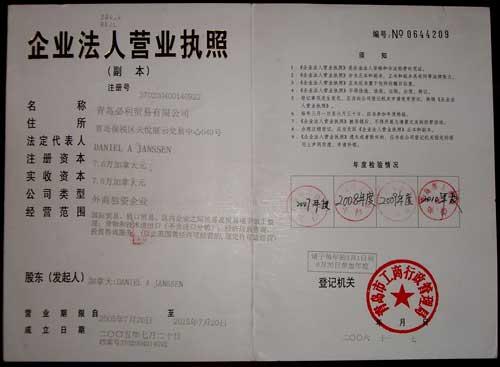
From the top left:
Line 1: Business license number (Document number is on the top right.)
Line 2: Company’s name.
Line 3: Company’s legal address.
Line 4: Authorized representative’s name.
Line 5: Total registered capital.
Line 6: Total investment.
Line 7: Type of business.
Line 8: Business scope.
Line 9: Director or top manager’s name.
Line 10: The period the company was registered for.
Line 11: In Chinese, when the company was registered.
On the right:
Line 1: Basic explanation of the terms. (9 points)
Line 2: Stamps or chops that show the annual renewal dates.
Line 3: Official chop from the bureau that registered the company.
Step 3:
Confirm their legal address and their operating address. Often this is two different locations as is the case with my company. Qingdao Bili International Trading Co., Ltd is registered in the Free Trade Zone of Qingdao but I have an office and operate in downtown Qingdao.
If you intend to visit you will need to know the address of their place of operations so be sure to get all addresses associated with the company in question.
Step 4:
Confirm their legal representative and his/her contact information. The legal representative of the company is the boss. He or she is the name on the business license and ultimately responsible and liable for the business and its activities. Often the website or the person you are in contact with is not the legal representative, he or she may be a project manager or someone assigned to your project. Get the bosses information for if you ever have, and you will have a hassle, a serious management issue or even a warranty claim you want to be sure you have access to the boss so you can get a straight answer from the ultimate decision maker.
Step 5:
Get a personal visit detailed check from the local bureau which can be done by any Chinese person going down with their ID to register or have a law firm do the detailed check in person from the local bureau. For the few hundred RMB it will cost this is highly recommended. There are several reasons for this. First is it is very valuable to have a relationship with a corporate lawyer because it is almost inevitable that one will be required if you do enough business with China.
Second they can physically go down and do the official check and tell you the current status. They can help you ensure you have a good contract which is the most over looked aspect in China business. Believe me if you have no contract then there is no accountability and the Chinese know it and can always beat around the bush with issues that lead no where. If you have a detailed contract then everybody knows you have some power and this in turn promotes accountability. The courts here are very simple and straight forward, if you have something signed and chopped by the supplier then they will act if not they do nothing. Plus if a lawyer reminding the supplier of their obligation will be very powerful in the eyes and mind of the Chinese.
Now that you have done your due diligence and confirmed the company is legitimate you should consider the following checks and processes to give you the best chance at a successful relationship with your new Chinese partner.
Additional Checks:
Approvals:
You may want to check if they have ISO / CE / TUV / CSA / UL or other certificates to support their quality claims. For this you simply ask them to provide a copy of their certificate then you can contact that organization and provide the document number and they should be able to verify if the document is authentic.
Business or Working Relationship Expectations:
NDA:
This means “non disclosure agreement” and is highly recommended to create and translate into Chinese before you send the supplier / company any information regarding your products, especially if you have any care or concern about protecting your design or Intellectual Property rights.
Another key point the lawyer can help you with. The below law firm has an excellent template they will probably give you with slight adjustments for your specific company and the products and or services you plan to develop.
Supply System or Outline for Working Relationship Expectations:
My company has developed a document that outlines the expectations for communication, quotations, delivery, and general ethics regarding a business relationship. This is again very important because it sets the stage for how business is going to be done.
This culture is very different and you the customer want them to understand you and your expectations right from the start. Here is a good example to illustrate this point: Much of the business here is face-to-face and the technology they use all the time as you will see on almost every Chinese website is the web-chat programs like QQ or ICQ. These are the annoying pop up dialogue boxes that you can click on and have live chat. Although they can be useful for some things I have a strict policy in my company that they will not be used, I won’t even allow them to be downloaded to any of the work stations.
The big problem is here is that the suppliers like to talk, and talk, and talk, and talk and firstly waste a bunch of time and second negotiate a lot of instructions or changes that should be in written form and approved the leadership of both companies not some agreement that has no written record of. In the past when a problem developed the supplier would say “well you guys said this or that” and I would say “I didn’t agree to this, where is the approval document?” to which they would reply “I was chatting with so and so and I thought we agreed to do it like this”. Your screwed and you have no where to go.
One strict rule that must be made clear right from the beginning is no changes to price, parts, materials, processes or anything without written authorization from the legal representatives.
Contract:
This I cannot stress enough and find it is very seldom done. You must have a written contract between Party A and Party B signed by the legal representatives that clearly spells out exactly what is going to be made, how much it is going to cost and the terms of payment, who is responsible for what, what is the warranty and who is responsible for shipping of replacements, etc, etc, etc. Think through the key questions and have them all answered in a manufacturing agreement. (Who, what, where, why, when and how.)
I will again repeat a critical rule mentioned above. This rule again is a must and should be verbalized over and over again, written in the above Supply System document and clearly written in the contract and that is “No changes to price, parts, materials, processes or anything without written authorization from the legal representative.” (See draft manufacturing contract for some ideas on this agreement.)
Conclusion:
Both of the above examples “Mark from Canada” and The “Poland Glass Importer” would not have had the problems and losses they had if they had followed the steps and advice above. Not to mention all the stress, frustration and anger that was expelled during the whole process. And guess what? You are the only one who lost! It cost you your time, production downtime, money, stress for the whole company and probably your family and the Chinese probably just told their friends “Wow, those foreigners are really crazy and have lots of issues.” and forgot about you before they woke up the next day.
These are all simple steps which help clarify the business relationship, outline the working expectations and set the tone of how the business will be done. It provides protection and accountability for all parties and is certain to help you to make your China experience a positive long lasting one.
Who can help you to check out a Chinese company:
Of course we do all this and much more if we are managing your project so if you have a project that requires sourcing, management and quality controls with accountability then Bili International Trading Co., Ltd is one of the best in the business, Contact Us here or see our list of services for more details.
f you require a good, but inexpensive law firm to assist you to do the above due diligence and you do not have the ability then I highly recommended you have a law firm to do it for you. It won’t cost very much and you will have also started a relationship with someone that can help you with contracts, understanding China law and they probably even have a good selection of clients that can probably provide you product.
A Qingdao law firm that has multiple language capability, excellent corporate lawyers and a recommended contact of mine, a sharp young man that speaks excellent English and has worked in the manufacturing industry before is a good place to start. YouHua has contacts throughout China and provides services in Chinese, English, French and German. For English or Chinese so feel free to contact Scott directly at:
Lawyer | |
Allbright Law Office (Qingdao) | |
手机 / Cell: | +86-15866820170 |
电话 / Tel: | +86-532-55769166 |
传真 / Fax: | +86-532-55769155 |
邮箱 / Email: |
Links to the Industrial and Commercial Administration Bureau’s of China and Online Check.
Instructions for searching using the above websites:
Log on to the appropriate bureau's website. | 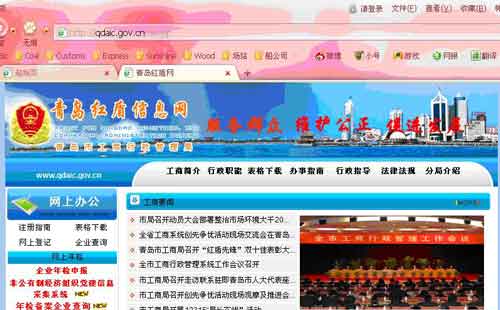 |
Click “Company search”. | 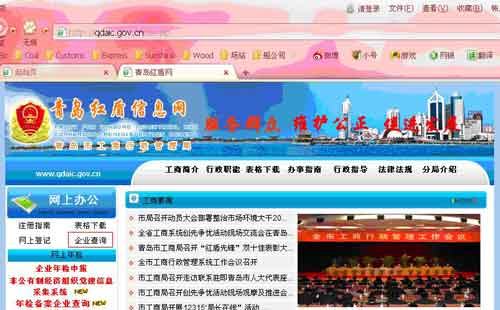 |
Register user name and password. | 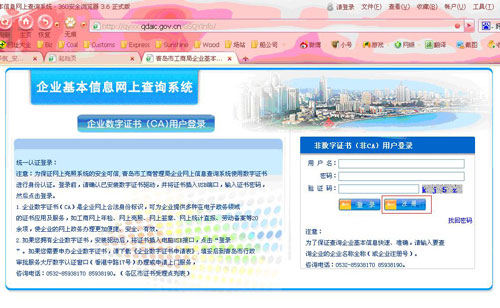 |
Enter company name and code (bcym) and click "search". | 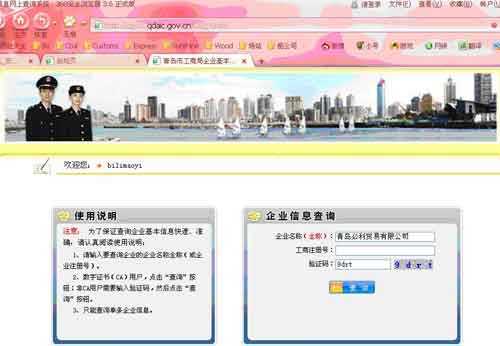 |
Review the results. |  |
Sincerely,
Daniel A. Janssen
General Manager:
Qingdao Bili International Trading Co., Ltd
To Download the this article How to Verify a Chinese Company in PDF click here.
Related articles from Bili International:
Product Development: From concept to design to prototyping to production in ChinaBili International explains the basics of product development in China and how to go from concept to prototype to production.
Project management in China: The ups and downs of managing a project in ChinaBili International shares their experience on the challenges of managing a project in China. The “Do’s and Don’ts” and some insight you need to know to manage your projects successfully.
Quality in China: What is and How to get Consistent Quality in a Developing ChinaUnderstanding quality in China: What to look for and how to manage a quality system in this developing country China.
How to identify a fake Chinese company: Preventing you from being scammed in ChinaDon’t be fooled by a fancy commercial website that offers very low prices. Many people are being scammed by bogus companies so read this article to help prevent this from happening to you.
How to Outsource from ChinaBili International will provide you with tips, some valuable experience, and the best places to go to find reliable suppliers for your company or specific product needs.
Wholly Owned Foreign Enterprise (WOFE): How to set up a factory in ChinaBili International explains the general rules, steps, and common pitfalls in setting up a foreign owned company in China, generally known as a “Wholly Owned Foreign Enterprise” or WOFE.
